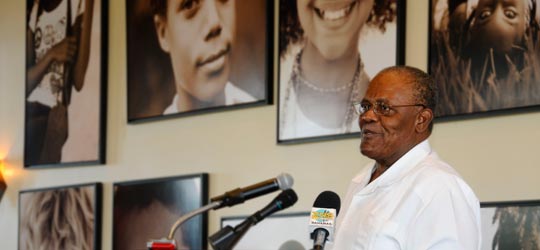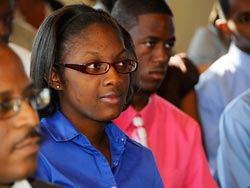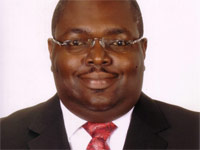
Remarks Right Honourable Hubert Ingraham Prime Minister
Opening Ceremony Marco City Youth Leadership Institute
5 November, 2011
Good Morning.
I am happy to join you for the opening ceremony of the Marco City Youth Leadership Institute for Senior Students. I am happy to share with you some “Lessons for Leadership” which I gained from my own experience and from my observance and interaction with other leaders here at home and abroad.
First things first however; I commend Zhivargo Laing, Member of Parliament for Marco City and Minister of State for Finance for launching this programme for high school seniors on Grand Bahama. It is always important that we begin to identify future leaders and expose them to experiences that will help to sharpen and build their skills.
This programme facilitates interaction between young people and professionals from throughout The Bahamas. It includes practical training in a number of important areas: goal-setting and planning; inter-personal skills; college preparation; effective communication; decision-making; job search and work performance; starting a business and financial management.
Last year 41 students participated in the programme. It was my pleasure to receive those participants in the Cabinet Office in Nassau. During our discussion students were engaged and took full advantage of the opportunity to interact with me.
I signal my strong support for these planned training and development mentorship initiatives that expose promising young people to practical opportunities to hone leadership skills.
It was my support of mentoring programmes that caused me to include in my first Cabinet beginning in 1992, young men and women who, I believed, possessed leadership traits. I sought to provide them with opportunities to grow as leaders by participating at the highest level of national development.

Let me say that you are here because someone has seen leadership potential in you. It is difficult if not impossible to train someone without leadership potential to become an effective leader. Leadership is in many respects an innate gift or aptitude possessed by an individual which causes others to choose to follow him or her and to look to him or her for leadership.
You do not have to be the head of an organization, business, political party, or government to be a leader. Leaders are persons whose views and advice are respected and sought out. A leader may be a member of a family to whom everyone turns for advice – including the head of the family!
Leaders are individuals who head church groups, choirs, trade unions, neighbourhoods’ associations and social clubs. You can be a leader simply by influencing others including Heads of organizations. So none of you should be confused into believing that to be a leader you must be the Head of an organization, business, church or an elected Member of Parliament.
Interestingly, an individual’s ability to lead is most frequently identified by others. If I use my experience as an example, long before I had ever dreamt of becoming a Member of Parliament, Kenneth Major from Coopers Town, Abaco told me that I would be an MP one day. Later, Lynden Pindling identified me, at the early age of 28 – to become National Chairman of his Party. Later still, the people of Coopers Town decided to make me their candidate for the House of Assembly and then elected me. With their continued support, I continued as a MP even after I had been fired from Mr. Pindling’s Cabinet, was expelled from the PLP and denied the right to seek re-election on the PLP ticket. But Coopers Town had decided that I was their leader and they re-elected me as an Independent.
Still later, the FNM would invite me to join their Party and to become their Leader. With the support of the FNM and the good people of Marco City, the place where my leadership skills were first tested at the National level, and later with the support of the people of The Bahamas who believed that I should lead them, I was privileged to become Prime Minister of The Bahamas.
LESSONS IN LEADERSHIP
Dear Participants:
Leadership is critical to every aspect of society, be it in the family, school, church, business or government.
Leadership requires that an individual is focused and determined to achieve set goals. A leader must be able to inspire trust and to instill confidence in others that he can lead and that he can help them to achieve what they desire. Leaders must have a clear appreciation for the circumstances in which they work and be able to articulate a strategy to realize the vision, goals and objectives of the group.
I believe it is always best to lead by example. In the end, leadership is about doing. It is not about talk. By your deeds… Often you hear a parent commenting “I wish my boy (or girl) was more like “Joe” or “Sally”. That would be because they have seen a trait in Joe or Sally that they consider good and positive, something to be emulated, copied or followed. That is what leaders strive to achieve, to be and to act in ways that cause others to want to be like them and to follow them to achieve a shared goal or objective.
Leadership requires the ability to make choices. Good, effective leadership requires courage because very often, the choices available are difficult, certainly unpopular ones. If you need to be liked or loved by everyone or need everyone to be happy with every decision you make, you are unlikely to be an effective leader.
That is why, especially in the public sphere, leaders must have very thick skin. Leaders must be able to take criticism, sometimes hurtful criticism without becoming angry or vengeful.
Many decisions made by leaders, including decisions made to ensure equality, fairness or equity for the greater whole, can and does produce dissension and conflict. You see when you are seeking to improve conditions for all you might unfavorably impact some individuals in the whole. To be fair to all, someone is likely to have to give up something. That means someone is losing.
Take as an example two children told to share a sandwich. One takes a larger portion than the other. A parent intervenes and insists that both get equal parts. The child who had taken the larger portion may become angry because he is forced to give up a part of the portion he took so that the other child may have an equal part of the sandwich. Imagine the sandwich is a number of contracts being issued among businesses. Imagine the it is the award of scholarships to one household to the exclusion of another household, or a job.
It is the leader’s job to get as much information as possible, consult where necessary, weigh options, prioritize and balance the pros against the cons and then make a decision.
It is always easiest to lead in good times. A leader’s metal is tested during times of hardship
In my tenure as Prime Minister, I have led in good and bad times. In each circumstance I have been guided by the fact that I need always to have clarity of mind, singleness of purpose and strength of character. I have always sought to keep a steady head.
You listen and where you feel the criticism is legitimate, you correct your course if you can. However, where you believe that the criticism is unwarranted you move on and simply continue to do your job. We all appreciate the praise of others. But the better leaders simply want to do the best they can.
Leadership requires smart and hard work. A lazy person cannot be an effective leader. Effective leaders almost always must be to work well before everyone else and leave long after everyone else.
Leadership requires putting in lots of hours thinking, conceiving, planning, organizing and implementing programmes and projects. You must have a solid work ethic to successfully do all these things. This can mean long hours away from your loved ones or friends. It might mean giving up some of the things you personally enjoy doing.
Leadership is a lonely position. Sometimes you can’t share your thinking with anyone. And oftentimes, leaders are blamed for the actions of others; that is called being responsible and accepting responsibility. Many take credit for good; few accept blame for bad.
Honesty and integrity are important in leadership. You must perform your duty as a leader with the appreciation that you must be accountable for your actions in the current circumstance and in the face of history. Leadership means treating people fairly and keeping your hands clean from corruption.
CLOSING
I urge each of you participating in this programme to take full advantage of this excellent opportunity being provided for you. Zhivargo Laing is an excellent role model for all of you. He has been identified by many different groups as a leader beginning from a very young age.
Minister Laing was elected President of the College of the Bahamas Union of Students, served as a youth pastor in his church, was elected as Member of Parliament and selected to serve in the Cabinet of the Bahamas – the youngest person to do so in our country since Independence.
He is using his experience as an example for you to emulate; he wants to see many of you follow in his path and contribute to our country’s development by being leaders for positive change; leaders for development and leaders to make The Bahamas better for all of us.
I have every confidence that you will learn those lessons well by your participation in this programme.
It is my understanding that your Group will once again travel to New Providence as part of your exposure; I look forward to having you visit with me when you do.
Thank you and Good Morning.



